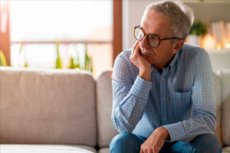New publications
Loneliness reduces the number of healthy years in older adults
Last reviewed: 02.07.2025

All iLive content is medically reviewed or fact checked to ensure as much factual accuracy as possible.
We have strict sourcing guidelines and only link to reputable media sites, academic research institutions and, whenever possible, medically peer reviewed studies. Note that the numbers in parentheses ([1], [2], etc.) are clickable links to these studies.
If you feel that any of our content is inaccurate, out-of-date, or otherwise questionable, please select it and press Ctrl + Enter.

A recent study published in the journal BMC Public Health determines the impact of loneliness on healthy life expectancy (HLE) and identifies ways to improve subjective well-being and health among older people.
Loneliness is a feeling of disconnection and dissatisfaction in relationships. Loneliness has been identified as a significant and well-studied predictor of mental and physical illness.
Loneliness can activate autonomic nervous responses, causing chronic stress. Loneliness can also worsen age-related diseases and increase the risk of cardiovascular disease (CVD), disability, dementia, and frailty. Loneliness may affect men and women differently; lonely older women are more likely to suffer from depression and loss of physical function.
As urbanization increases in China, traditional family ties and the availability of family support have weakened. Older adults in China are at greater risk of loneliness; it is estimated that up to 25% of them experience loneliness.
This study used data from the China Longitudinal Study of Healthy Ageing, which included 15,500 people aged 65 to 99 years. Participants were asked about their activities of daily living (ADL) and self-rated health (SRH) as measures of health and well-being.
Instead of assessing the presence of specific diseases, participants' health was assessed using ADL and SRH. Using HLE instead of disease prevalence measures also avoided survival bias.
The aim of this study was to identify associations between loneliness and life expectancy (LE) in each age group, HLE and the expected healthy proportion of life expectancy.
The average age of the participants was 72.9 years. Older women were more likely to be uneducated, have lower incomes, have lost their spouse, and live alone.
Loneliness was also more common among women (29.5%) compared to men (20.2%). However, about 96% of both men and women were physically active, with 82.5% of men and 85.3% of women considering themselves healthy.
One year after the study began, lonely older adults were more likely to remain ill than those who did not experience loneliness. Lonely older adults were also more likely to die during this period, regardless of their baseline health.
Lonely people had lower ADL and SRH scores. Life expectancy at age 65 for lonely people was 20 years compared to 23 years for non-lonely people.
The study found that loneliness has a significant impact on healthy life expectancy in older adults, especially women. These findings highlight the need for targeted health promotion programs to mitigate the negative effects of loneliness, especially among older women.
Conclusions
- Loneliness is associated with poor physical and mental health.
- Older women are more susceptible to the effects of loneliness.
- Loneliness can lead to decreased ADL and SRH, which ultimately affects life expectancy and quality of life.
- Targeted interventions are needed to improve well-being and health among older people, especially women.
